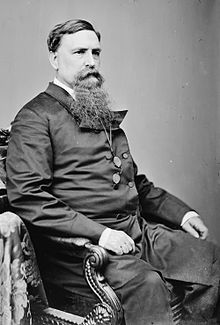Thomas Swann
Thomas Swann (born February 3, 1809 in Alexandria , Virginia , † July 24, 1883 in Leesburg , Virginia) was an American politician and from 1866 to 1869 governor of the state of Maryland . Between 1869 and 1879 he represented his state in the US House of Representatives .
Early years and political advancement
Thomas Swann attended what is now George Washington University in Washington, DC and then until 1827 the University of Virginia . He then studied law in his father's law firm. In 1833 he was appointed secretary by President Andrew Jackson at the American Embassy in Naples , then the capital of the Kingdom of the Two Sicilies . On his return in 1834, he moved to Baltimore . Between 1847 and 1853 he was president of two railroad companies and from 1856 to 1860 he was mayor of Baltimore . During his tenure there were temporary unrest there, which led to conflicts with the then governor Thomas Watkins Ligon . On the other hand, the infrastructure of the city and the port facilities were expanded at that time. During his time as mayor of Baltimore, Swann was a member of the so-called Know-Nothing Party . After its dissolution, he joined the Union Party around 1860 , which campaigned for the preservation of the Union. On November 8, 1864, he was elected the new governor of his state. Thomas Swann was the first and only governor of Maryland under the new constitution, enacted in 1864.
Governor of maryland
Swann took up his new office on January 10, 1866. That year he was also elected US Senator . He declined this post because he preferred the governorship. During his tenure, the consequences of the war of civil secession had to be overcome. He succeeded in banishing the radical Republicans into the opposition and preventing former supporters of the South from being disenfranchised. During this time he supported the reconstruction policy of President Andrew Johnson . He also joined the Democratic Party during these years . At that time, the port facilities in Baltimore were expanded and a new constitutional reform was carried out, which came into force in 1867.
Another résumé
After the end of his governorship, Swann was elected to the US House of Representatives. There he represented his state between 1869 and 1879. He was temporarily chairman of the Committee on Foreign Affairs. After his tenure in Congress ended , Swann retired from politics. He died in July 1883. Thomas Swann was married twice and had a total of five children.
Web links
- Thomas Swann in the National Governors Association (English)
- The Political Graveyard (English)
- Thomas Swann in the Biographical Directory of the United States Congress (English)
- Thomas Swann in the database of Find a Grave (English)
| personal data | |
|---|---|
| SURNAME | Swann, Thomas |
| BRIEF DESCRIPTION | American politician, governor of Maryland |
| DATE OF BIRTH | February 3, 1809 |
| PLACE OF BIRTH | Alexandria , Virginia |
| DATE OF DEATH | July 24, 1883 |
| Place of death | near Leesburg , Virginia |


